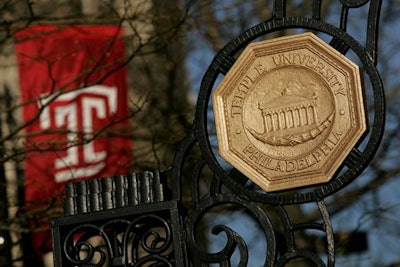 Temple University is one of four “state-related” universities in Pennsylvania.
Temple University is one of four “state-related” universities in Pennsylvania.HARRISBURG, Pa.—Some Pennsylvania state lawmakers want state-owned universities to be able to leave the 14-member State System of Higher Education and on Tuesday outlined the details of a proposal to allow it.
Sen. Tommy Tomlinson, R-Bucks, a sponsor of the bill, said the schools need more flexibility to cope with enrollment trends and financial pressures. He would permit them to become “state-related” universities, a group that now includes only Penn State, Pitt, Lincoln and Temple.
“I think we have a train wreck coming, financially,” Tomlinson said at a Capitol news conference.
Schools that leave the Pennsylvania state university system, one of the nation’s largest, would have to pay back the value of their property over 30 years. Opponents said the idea would trigger higher tuition and leave the universities with less oversight and accountability.
“This legislation will funnel taxpayer money to institutions that don’t have to answer to the taxpayers,” said Steve Hicks, president of the schools’ union for teachers and coaches, the Association of Pennsylvania State College and University Faculties. “That may be politics as usual, but it is not in the best interests of our students or the commonwealth.”
Tomlinson said he was concerned that, without changes, some of the schools will have to close, victims of budget problems and dwindling enrollment.
Schools would be eligible if they have at least 7,000 students, favorable recent audits, the financial ability to pay for the property and will maintain pension payments.
System Chancellor Frank Brogan said the proposal needed to be reviewed for how it might affect students, including the possibility of higher tuition and fees.
“This would create an added burden for students and their families,” Brogan said in a release Tuesday. “Every university that leaves the state system could close another door to affordable, quality public higher education.”
Brogan told the Pittsburgh Post-Gazette last week that the new status could be harder to accomplish than the schools may think and that people may not want to see their tax dollars used that way.
“They believe that money is being used to provide them the professors, the support staff, the opportunity today to better their educational experience,” Brogan told the paper. “They sure don’t believe it’s going to be squirreled away in part by those institutions (to) buy their way to quasi-private status.”
A message seeking comment from the governor’s office, which has proposed flat funding for the state system next year, was not immediately returned Tuesday.
The state system universities include Bloomsburg, California, Cheyney, Clarion, East Stroudsburg, Edinboro, Indiana, Kutztown, Lock Haven, Mansfield, Millersville, Shippensburg, Slippery Rock and West Chester. It also operates branches in Clearfield, Freeport, Oil City and Punxsutawney and several regional centers, including the Dixon University Center in Harrisburg and PASSHE Center City in Philadelphia.





















